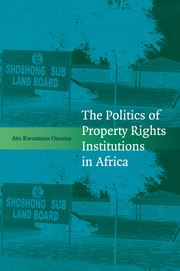Book contents
- Frontmatter
- Contents
- List of Maps and Tables
- Acknowledgments
- List of Abbreviations and Acronyms
- 1 Map of Botswana
- 2 Map of Ghana
- 3 Map of Kenya
- 1 Divergent Attitudes Towards Property Rights Institutions
- 2 Explaining Institutional Choice and Change
- 3 Varying Responses by Ghanaian and Batswana State Leaders
- 4 Traditional Leaders Take Charge in Akyem Abuakwa and Ga
- 5 Building and Then Demolishing Institutions in Kenya
- 6 Endogenous Contributions to Institutional Change
- 7 Conclusion
- Appendix: Notes on Field Research
- Index
- References
3 - Varying Responses by Ghanaian and Batswana State Leaders
Published online by Cambridge University Press: 04 May 2010
- Frontmatter
- Contents
- List of Maps and Tables
- Acknowledgments
- List of Abbreviations and Acronyms
- 1 Map of Botswana
- 2 Map of Ghana
- 3 Map of Kenya
- 1 Divergent Attitudes Towards Property Rights Institutions
- 2 Explaining Institutional Choice and Change
- 3 Varying Responses by Ghanaian and Batswana State Leaders
- 4 Traditional Leaders Take Charge in Akyem Abuakwa and Ga
- 5 Building and Then Demolishing Institutions in Kenya
- 6 Endogenous Contributions to Institutional Change
- 7 Conclusion
- Appendix: Notes on Field Research
- Index
- References
Summary
Residents of the prestigious Airport Residential Area in Accra, Ghana, woke up to a bewildering sight on April 12, 1999. With protection from well-armed members of the Ghana Armed Forces, the Accra Metropolitan Assembly (AMA) was using bulldozers to demolish a newly constructed, $3-million-dollar, 65-bedroom hotel. In the days that followed, Ghanaians were to learn that the Salaam Hotel was owned by a certain Alhaji Yusuf. The AMA made strenuous efforts to convince Ghanaians that the demolition was nothing out of the ordinary, and that it was carried out after Alhaji Yusuf failed to comply with an order to stop building in a water-logged area. Given the widespread practice of building with little attention to building codes in the capital, many Ghanaians refused to believe the story that it was a normal demolition. Besides, all the other buildings in close proximity to the Salaam Hotel, which were clearly sitting in waterlogged plots too, were left untouched by the AMA.
Suspicion that the demolition was part of very high Ghanaian politics over control of the state was strengthened as the days unfolded. President Jerry Rawlings and his vociferous strongman, Tony Aidoo, both publicly defended the demolition. Their efforts at justifying the demolition took it out of the realm of ordinary AMA business. The use of well-armed soldiers instead of the police to provide protection for the demolition team also fueled suspicion that very senior government officials had a hand in the demolition.
- Type
- Chapter
- Information
- The Politics of Property Rights Institutions in Africa , pp. 61 - 104Publisher: Cambridge University PressPrint publication year: 2009



